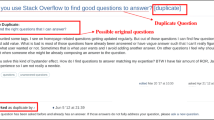Abstract
Community Question Answering (CQA) websites are becoming increasingly important sources of information where users can share knowledge on various topics. These websites provide many opportunities for users to seek for help and provide answers, but they also bring new challenges. One of the challenges is that most new questions posted everyday cannot be routed to appropriate users who can answer them. It means that experts are not provided with questions matching their expertise, and therefore new questions cannot be answered in time. Our main goal is to find which user has more potential to be the best answerer for a newly posted question. In this paper, we propose an approach which based on convolutional neural networks (CNN) to predict the best answerer for a new posted question on CQA websites. We have applied our model on the dataset downloaded from StackOverflow, one of the biggest CQA sites. The results show that our approach performs better than Segmented Topic Model.
Access this chapter
Tax calculation will be finalised at checkout
Purchases are for personal use only
Similar content being viewed by others
References
Adamic, L.A., Zhang, J., Bakshy, E., Ackerman, M.S.: Knowledge sharing and Yahoo answers: everyone knows something. In: Proceedings of the 17th International Conference on World Wide Web, pp. 665–674. ACM (2008)
Yang, J., Wei, X.: Seeking and offering expertise across categories: a sustainable mechanism works for Baidu knows. In: ICWSM (2009)
Cavusoglu, H., Li, Z., Huang, K.W.: Can gamification motivate voluntary contributions? The case of stackoverflow Q&A community. In: Proceedings of the 18th ACM Conference Companion on Computer Supported Cooperative Work & Social Computing, pp. 171–174. ACM (2015)
Bhat, V., Gokhale, A., Jadhav, R., Pudipeddi, J., Akoglu, L.: Effects of tag usage on question response time. Soc. Netw. Anal. Min. 5(1), 1–13 (2015)
Balog, K., Azzopardi, L., De Rijke, M.: Formal models for expert finding in enterprise corpora. In: Proceedings of the 29th Annual International ACM SIGIR Conference on Research and Development in Information Retrieval, pp. 43–50. ACM (2006)
Fu, Y., Xiang, R., Liu, Y., Zhang, M., Ma, S.: A CDD-based formal model for expert finding. In: Proceedings of the Sixteenth ACM Conference on Conference on Information and Knowledge Management, pp. 881–884. ACM (2007)
Petkova, D., Croft, W.B.: Hierarchical language models for expert finding in enterprise corpora. Int. J. Artif. Intell. Tools 17(01), 5–18 (2008)
Liu, X., Croft, W.B., Koll, M.: Finding experts in community-based question-answering services. In: Proceedings of the 14th ACM International Conference on Information and Knowledge Management, pp. 315–316. ACM (2005)
Qu, M., Qiu, G., He, X., Zhang, C., Wu, H., Bu, J., Chen, C.: Probabilistic question recommendation for question answering communities. In: Proceedings of the 18th International Conference on World Wide Web, pp. 1229–1230. ACM (2009)
Riahi, F., Zolaktaf, Z., Shafiei, M., Milios, E.: Finding expert users in community question answering. In: Proceedings of the 21st International Conference on World Wide Web, pp. 791–798. ACM (2012)
Chang, S., Pal, A.: Routing questions for collaborative answering in community question answering. In: Proceedings of the 2013 IEEE/ACM International Conference on Advances in Social Networks Analysis and Mining, pp. 494–501. ACM (2013)
Dong, H., Wang, J., Lin, H., Xu, B., Yang, Z.: Predicting best answerers for new questions: an approach leveraging distributed representations of words in community question answering. In: 2015 Ninth International Conference on Frontier of Computer Science and Technology, pp. 13–18. IEEE (2015)
Mikolov, T., Dean, J.: Distributed representations of words and phrases and their compositionality. In: Advances in Neural Information Processing Systems, pp. 3111–3119 (2013)
Kim, Y.: Convolutional neural networks for sentence classification. arXiv preprint arXiv:1408.5882 (2014)
Collobert, R., Weston, J., Bottou, L., Karlen, M., Kavukcuoglu, K., Kuksa, P.: Natural language processing (almost) from scratch. J. Mach. Learn. Res. 12(1), 2493–2537 (2011)
Wang, S., Lo, D., Jiang, L.: An empirical study on developer interactions in stackoverflow. In: Proceedings of the 28th Annual ACM Symposium on Applied Computing, pp. 1019–1024. ACM (2013)
Xia, X., Lo, D., Wang, X., Zhou, B.: Tag recommendation in software information sites. In: Proceedings of the 10th Working Conference on Mining Software Repositories, pp. 287–296. IEEE Press (2013)
Du, L., Buntine, W., Jin, H.: A segmented topic model based on the two-parameter Poisson-Dirichlet process. Mach. Learn. 81(1), 5–19 (2010)
Acknowledgments
We thank the National Key Technology R&D Program (2015BAF20B02), the Natural Science Foundation of China (61272373, 61572098, 61300088), the Liaoning Province Natural Science Foundation of China (2014020003) for the funding support.
Author information
Authors and Affiliations
Corresponding author
Editor information
Editors and Affiliations
Rights and permissions
Copyright information
© 2016 Springer Nature Singapore Pte Ltd.
About this paper
Cite this paper
Wang, J., Sun, J., Lin, H., Dong, H., Zhang, S. (2016). Predicting Best Answerers for New Questions: An Approach Leveraging Convolution Neural Networks in Community Question Answering. In: Li, Y., Xiang, G., Lin, H., Wang, M. (eds) Social Media Processing. SMP 2016. Communications in Computer and Information Science, vol 669. Springer, Singapore. https://doi.org/10.1007/978-981-10-2993-6_3
Download citation
DOI: https://doi.org/10.1007/978-981-10-2993-6_3
Published:
Publisher Name: Springer, Singapore
Print ISBN: 978-981-10-2992-9
Online ISBN: 978-981-10-2993-6
eBook Packages: Computer ScienceComputer Science (R0)




